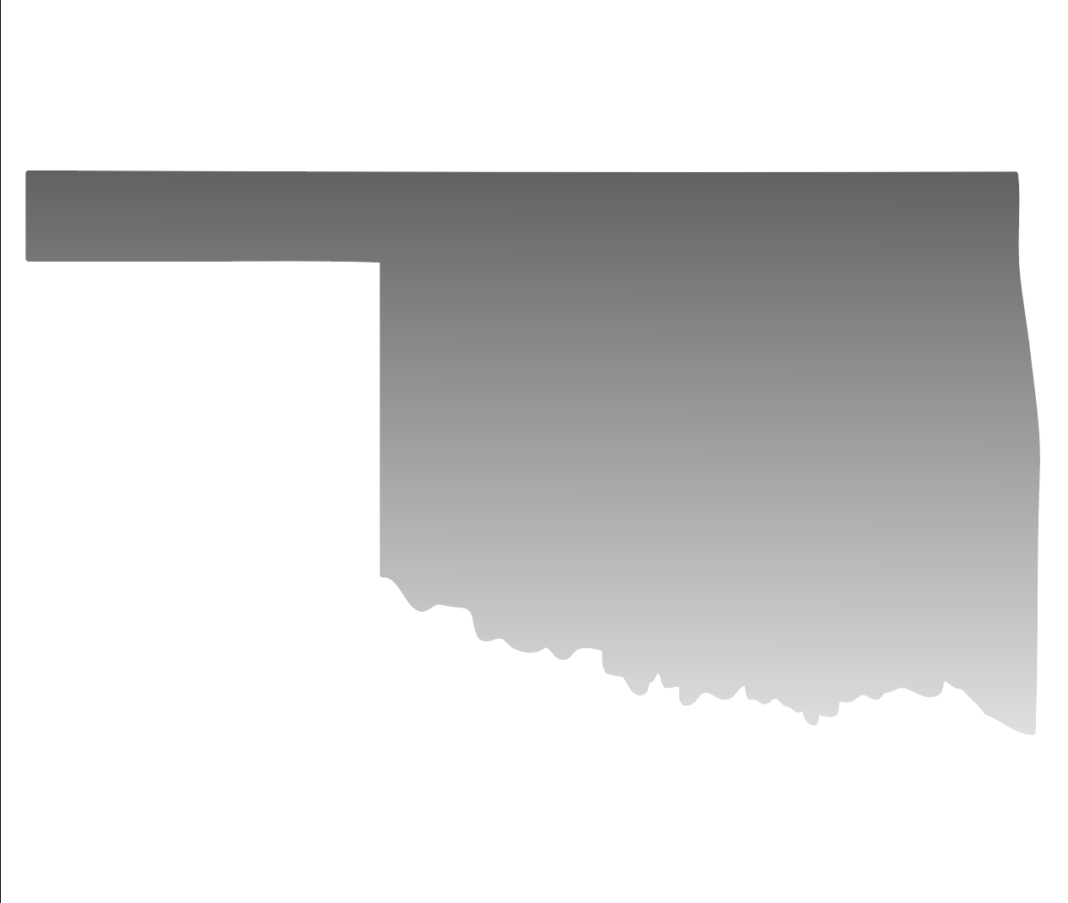By Tracy LeGrand and Faith Harl
6. Harvey Pratt
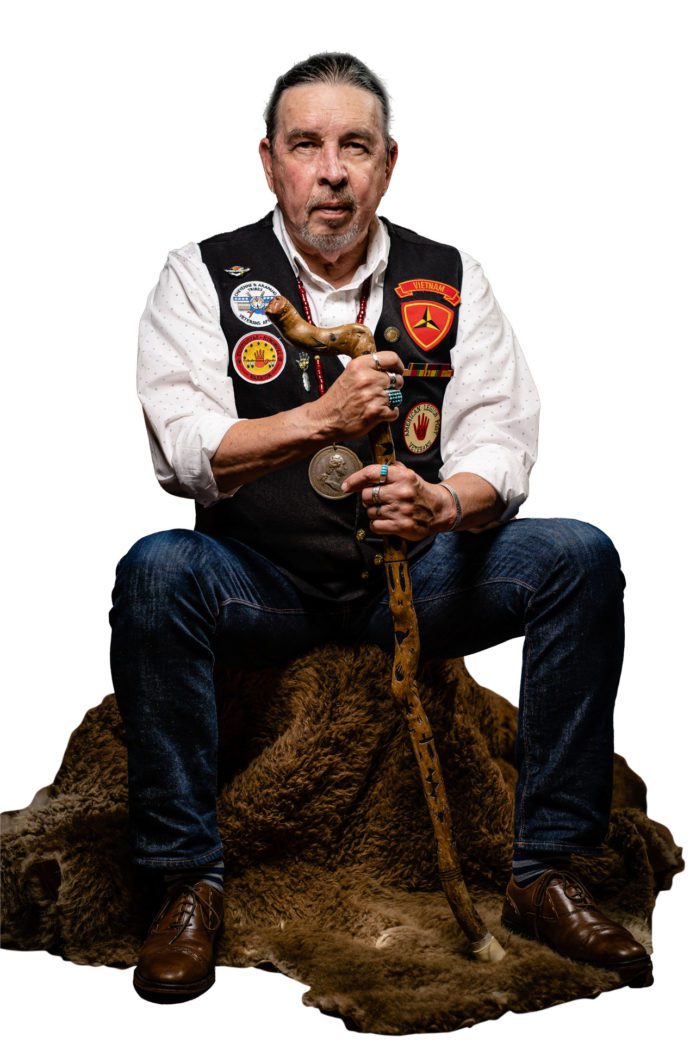
Harvey Pratt, along with being an accomplished forensic artist, teaches classes, consults on cases, and recently unveiled his piece, Warriors’ Circle of Honor, at the National Mall in Washington, D.C. Photo by Abraham Farrar
Forensic artist in law enforcement, artist
Cheyenne and Arapaho artist Harvey Pratt has assisted in thousands of arrests, and in the identification of hundreds of human remains, as a forensic artist. In recent years, his talents helped him nab the Smithsonian National Museum’s American Indian competition for the National Native American Veterans Memorial. His piece, Warriors’ Circle of Honor, is now located on the museum grounds at the National Mall.
As a child, Pratt was drawn to law enforcement and military because of family involvement, but his art skills were also encouraged at St. Patrick’s Indian Mission in Anadarko. Later, Pratt joined the Marine Corps and then the Midwest City Police Department. His first witness description drawing resulted in an arrest and conviction.
Pratt says he finds great satisfaction in solving crime via art, and in opportunities for continuing education, with credentials including the FBI National Academy and FBI Composite School. He continues to teach classes and consult on cases. While doing work with the Cheyenne and Arapaho office, Pratt heard about the Native American veterans’ memorial.
“I said ‘let me dream on it,’ and the next morning, I had an idea on how to reach all 573 federally recognized tribes in the U.S. by using the circle, the elements and the cardinal points,” he says.
Pratt’s design has come to life following an effort full of collaborations, postponements and learning curves in navigating government contractual specificities, he says. The result is an interactive work of living art.
“It was a labor of love, and we’re proud that our memorial was completed on time and in budget, with no federal money involved,” he says. “All money was donated money by tribes and friends of Indian people.
“Native people, men and women, are in the military per capita more than any other race or ethnicity,” says Pratt. “I’ve been asked why Indians fight for this country when treated poorly, and my thoughts are that God gave the Americas to Indians first. It’s our land, too. It’s important that the nation recognize Native American involvement.”
Although the memorial is to honor Native American veterans specifically, Pratt says it’s designed for all people, including “those of the past, those fighting now, and for the future of our grandchildren’s grandchildren,” he says. “And we invite all veterans, not just Indians, to feel that blessing and energy. We’ve gone at night and are happy to find it’s not just Native people who are sitting there to feel the blessing and energy.” -TL
5. Patty Gasso
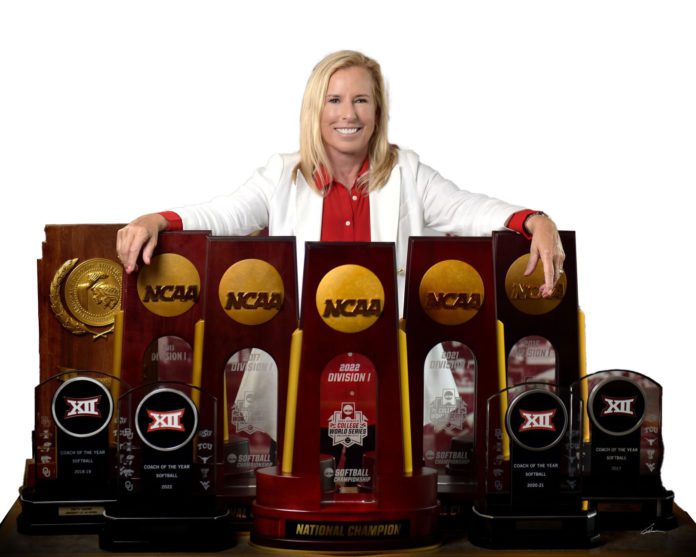
An accomplished athlete and coach, OU softball’s Patty Gasso won her sixth national title in 2022. Photo courtesy OU Athletics
Head softball coach – University of Oklahoma
Among college softball coaches nationwide, University of Oklahoma head coach Patty Gasso has an unrivaled record; she’s led the Sooners to the Women’s College World Series 15 times and has earned the school six national championship titles – most recently in 2022. Career honors include induction into the National Fastpitch Coaches Association Hall of Fame in 2012; winning Big 12 Coach of the Year 14 times; earning most Big 12 wins by a coach in league history at 376, as well as most wins by a coach at OU at 1,395.
While nabbing the 2022 championship title was exhilarating, Gasso is most proud of her athletes’ conduct during the tournament.
“Watching members of our team reach out to our opponents and ask them to join them in the circle for a prayer after games – and just watching them celebrate the national championship as a team and through their faith – I’ll never forget that,” she says.
Gasso, born and raised in California, bonded with her mom over a love of the LA Dodgers. She was a natural athlete, but was always drawn to coaching.
“I always knew I wanted to coach and teach, because I felt like if my mom could’ve chosen what she wanted to do, that’s what she would have chosen,” she says. “I knew I didn’t want to miss that opportunity.”
Gasso works hard to foster a sense of family within her team.
“I love being around the players, and my style is very much efficient, hardworking, game-like,” she says. “I’m not afraid to say what I have to say, but it’s always in a way of getting a player to understand what I’m trying to say, without demoralizing them or making them feel that they’re not good enough.”
In a career filled with success, community connections are treasured. Gasso says the 2013 season – following the Moore tornadoes – was likely the most important of her career.
“We were right in the middle of postseason play, and we took it upon ourselves to make that season about this state, the city of Moore and the university, and how we could bring relief, joy and pride … because it was so devastating for so many people,” she says. “Through our play and actions, we can change people’s lives without saying a word.”
Gasso is also known for setting high academic standards for her athletes.
“We have to keep pushing, with the expectation of understanding how important academics are in this life. If you stop learning, you stop growing,” she says. “It’s always been about bringing them in as girls, and having them leave as women. We have to be better rounded than just softball players; we have to be ready to go out and create a life for ourselves.” -TL
4. Pamela McCauley

Pamela McCauley works diligently to impact the STEM community worldwide. Photo courtesy Women of Color Magazine
Engineer, educator, author
Innovating and inspiring others are the fuel that has driven Pamela McCauley, Ph.D., to become an award-winning engineer and educator. Although she’s one of the most prominent researchers in ergonomics and biomechanics, McCauley grew from humble beginnings.
She moved to OKC as a teenager. After graduating from high school at sixteen, McCauley studied industrial engineering at the University of Oklahoma, and in 1993, she became the first African American woman in the state to graduate with a doctorate in the subject.
She credits her father as one of the biggest influences in her decision to pursue her career.
“My father passed last year,” McCauley says. “I get choked up just thinking about how proud he was of his baby, who got a doctorate degree from OU – the school he wanted to go to but was unable to because he was a Black man.”
In forging a path of her own, McCauley acknowledges her challenges. In her memoir, she discusses discovering that she was pregnant at the age of 15. McCauley persevered with support from family and teachers.
“So many other women could have the same experience, but we oftentimes don’t encourage them,” she says.
This lesson of helping others is one that McCauley has embodied throughout her career. In 2012, she became a Fulbright Scholar and led disaster recovery efforts in New Zealand. Three years later, she became a Jefferson Science Fellow with the U.S. Department of State and traveled to third-world countries to research healthcare service delivery for the treatment of HIV/AIDS.
McCauley is most proud of her work as program director of the National Science Foundation Innovation Corps. There, she helped diversify the program’s participants and challenge the status quo for granting promotion and tenure.
For her impact, McCauley has earned several distinctions and awards, including the “Technologist of the Year” from the Women of Color in Technology’s Conference. In 2022, McCauley was inducted into the Oklahoma Hall of Fame.
“I’ve been blessed with a lot of recognition, and I’m so humbled by it,” she says. “But there’s nothing like being loved and appreciated at home.”
Currently, McCauley serves as the Associate Dean of Academic Programs at the Wilson College of Textiles at North Carolina State University. Looking ahead, McCauley says that she hopes to continue to impact the STEM community.
“I’m still very excited about work,” she says. “I’ve been so fortunate to have an amazing career with challenges and ups and downs, and I’ve loved every minute of it.”– FH
3. David Nimmo
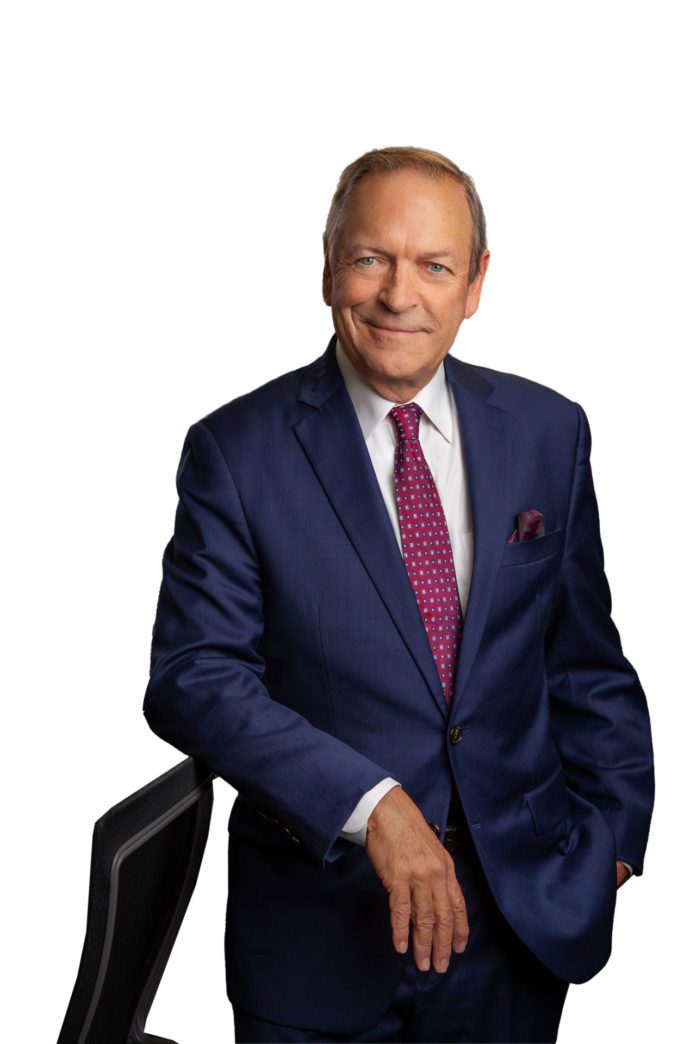
Chickasaw Nation Industries CEO David Nimmo says he’s focused on one thing moving into 2023: growth for the company and the Nation as a whole. Photo by Shevaun Williams
President/CEO – Chickasaw Nation Industries
Growth is necessary for the Chickasaw Nation to continue to thrive, says David Nimmo, president and CEO of Chickasaw Nation Industries. Nimmo, who has provided leadership to the Nation in various capacities for more than two decades, says CNI has recorded significant development in the last year, despite pandemic challenges.
“Our mission as a business is to build a company that can support a nation, so growth is important for us to reach that point where our distributable income can provide resources to enhance quality of life for every tribal member,” says Nimmo. “Last year … we saw 36% growth on the top line and 28% growth on the bottom line. Although it seems COVID was somewhat behind us, it is not behind us in terms of the federal government – which is our primary customer. For us to continue to have growth is a significant accomplishment.”
The pandemic changed the way people do business, and CNI molded with the times through ingenuity and flexibility.
“I can’t take credit; I’m proud of our team in developing new approaches,” he says. “They’re doing a fantastic job.”
CNI continues to look toward the future.
“The organic growth of acquisition is one of the things we’ll be looking at, because our business is principally government contracts, and that’s a cycle of three to five years,” he says. “In other words, 20-30% of our business falls off annually and we have to keep replacing that in order to grow bigger. In order to be big enough to support a nation, we continue to grow.”
That mission of moving the Nation forward drives Nimmo.
“We’re not creating wealth to buy a new Maserati,” he says. “We’re creating resources for healthcare and housing and eyeglasses and education.”
A born-and-raised Oklahoman, Nimmo says traveling around the country for his job has made him love the state even more.
“The quality of the people of Oklahoma is our hidden asset. Companies we acquire have an immediate affinity for us because they see the good neighbor and genuine attitude and are drawn to it,” he says. “This state, as a whole, has that down-to-Earth spirit, and it’s just really pleasant to live and work here. What we have is special and doesn’t exist everywhere. It’s hard to see, you just have to live in it to know.” -TL
2. Joanne Davis
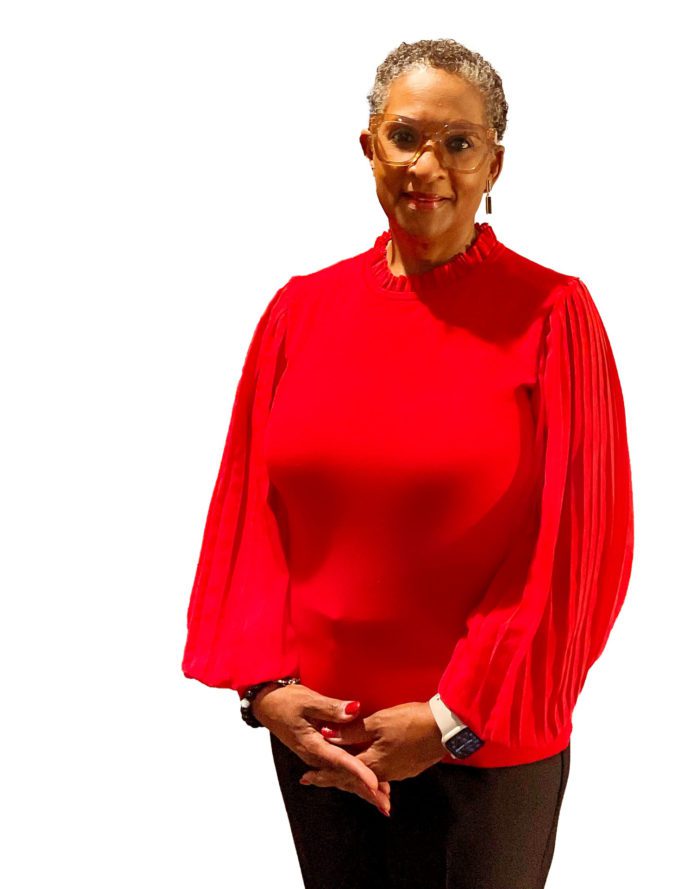
Among her many duties at the OKC Black Chamber of Commerce, Joanne Davis assists businesses in obtaining grants and negotiating lease agreements. Photo courtesy Joanne Davis
Executive director – OKC Black Chamber of Commerce
It’s not necessary to be a nonprofit behemoth to create a positive impact for minority-owned small businesses. This realization and other hard-won professional acumen drive Joanne Davis.
“The Chamber empowers Black and minority-owned businesses and economic interests across Oklahoma by sharing resources, building relationships and advocating for equal opportunity and equitable outcomes,” says Davis. “Founded on the desire to empower Black and minority-owned businesses and unite the community at large, the chambers exist to serve as an economic and professional resource, relationship builder and advocate.”
After retiring as a strategic source manager reporting to Tinker Air Force Base, Davis continued helping small businesses succeed in sustaining large governmental supply or service contracts. She enjoys a form of continuance in this field within her current role.
“Like any nonprofit, the job of executive director is bringing in money,” she says. “But as a smaller chamber, I feel that the mission is also advocacy and assistance.”
Davis began her tenure with the Chamber right around the start of the pandemic, and chose to focus on assisting businesses with money relief and grant applications.
“Small businesses often don’t have technology beyond their phones, and these governmental applications can take more than that to attain the contract, so they can get their piece of the pie,” says Davis. “For me, assisting with that is part of advocacy.”
The future for Davis means fostering more connections.
“We will continue to connect our members with good attorneys, with accountants who help them understand things like their business expenses and what it takes to access more business capital,” she says.
And looking back over the last few years, Davis is motivated by the success she’s seen.
“It’s special, to see people survive,” she says. “To see those who had been on the precipice of closing doors … but because they got additional funds or services, they’re still here. Maybe they got money to add on an outdoor area or received legal assistance. Lease negotiation can make all the difference for a small business, and helping when someone negotiates with their landlord to create a win-win situation – these are big highlights for me.” -TL
1. Kyle Dillingham
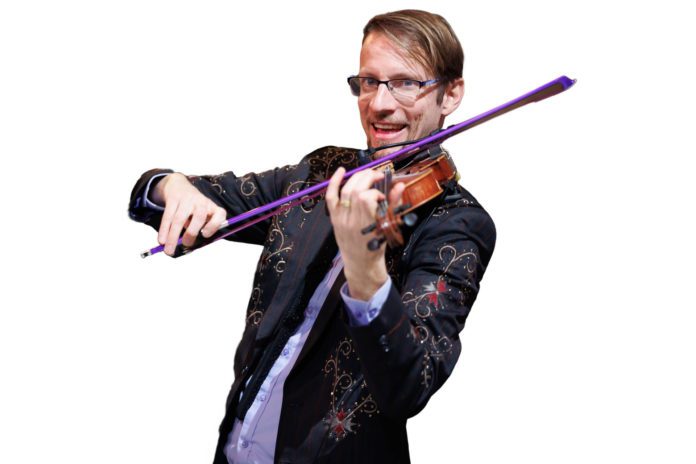
Musician Kyle Dillingham has had numerous opportunities to relocate for his work, but stayed in Oklahoma to invest in the state’s music development, he says. Photo courtesy Kyle Dillingham
Musician
Whether on stage at the Grand Ole Opry, performing for royalty or teaching as a musician-in-residence, musician Kyle Dillingham lives out his love for Oklahoma in all he does. The Enid-born violinist’s earliest memories are steeped in his grandpa’s beloved Western Swing tunes wafting from the radio, all across the Land Run-settled homestead that is still in the family – going on six generations.
Dillingham’s love of music is a passion that deepened with his fated acquisition of a garage sale violin the summer before fourth grade. Soon, Dillingham was immersed in lessons, jam sessions and opportunities for serious fiddling that eventually led to meeting Roy Clark and performing at the Grand Ole Opry while he was still in high school. As an accomplished fiddler, Dillingham earned scholarships and entry into international diplomacy through university-based musical ambassadorships. Recent highlights include an invitation to Thailand as a featured artist in a performance for Thai royalty. Though happily honored, this Oklahoma musician says he’ll always return home.
“Through the years, there have been opportunities to move to Nashville, Chicago and New York,” he says. “I was intentional from the beginning to remain based here and use my talents and energy to invest in music development and the entertainment industry of our state. There’s been what seemed like better opportunities at that moment … but I knew the best was for me to be in Oklahoma.
“I bring Oklahoma wherever I go. My fiddle was made in Oklahoma. I write songs that reflect the spirit of Oklahoma. I can’t help but feel that there is, culturally, something special here that makes its people especially capable and welcoming to those from other places.”
Though he’d been featured with other artists as a teen at the Grand Ole Opry, it wasn’t until 2019 that Dillingham got his big solo moment.
“I heard the announcer say, ‘And from Oklahoma City, Oklahoma…’ and it wouldn’t have been the same if I’d moved to Nashville. And in Thailand, at the king’s palace in front of the social elite of that country, they flew in a violinist from Oklahoma as a featured artist of the event. Money can’t buy the pride that comes from moments like that. It’s the result of making this place my home.”
The coming year includes the release of an emotional work in the form of a new LP.
“The title track is my personal tribute, almost an anthem, for the state of Oklahoma, and is for anyone who has a place they call home,” he says. “I love traveling and representing Oklahoma, but there’s nothing like flying home and looking down, and it’s beautiful; it’s home.” -TL






















